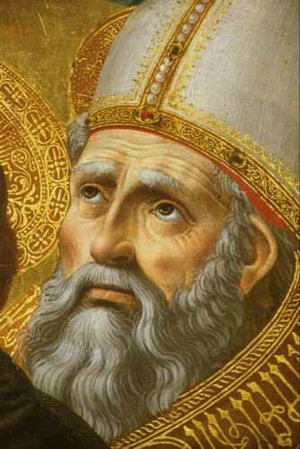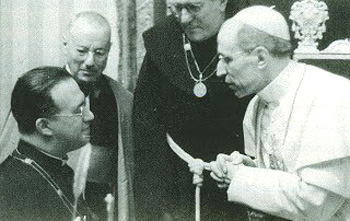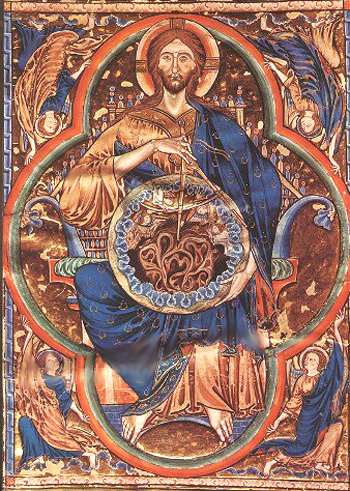Faith under Attack
 |
 |
 |
 |
 |
 |
 |
Wrong Position of Science on the
Creation of Matter
It is endemic to the faith to contrast the metaphysical findings of St. Augustine to the current progressivist answers to the beginning of creation, and thus of matter.
While concentrating on the first three chapters of Genesis, St. Augustine concluded that “the Will of God is the source of the act of creation. It is vain to ask why God so willed; there is nothing superior to God's Will. The world was created from nothing.” (1)
 It is true that Augustine speaks of an unformed matter (materia informis) from which all things were formed. However, this matter is itself created from nothing. Vernon Bourke makes this significant comment on the topic:
It is true that Augustine speaks of an unformed matter (materia informis) from which all things were formed. However, this matter is itself created from nothing. Vernon Bourke makes this significant comment on the topic:
“Augustine contrasts two types of knowledge, that of the evening and that of daylight. When things are known directly in themselves as parts of creation, they are known dimly, as if seen in the partial darkness of the evening. When the same things are known in their eternal principles (rationes aeternae), as they are in the Word of God, they are known clearly, in the full light of day. Hence, there is in the spiritual order a very real succession of night and day.” (2)
The ordinary mode of knowledge which the Angels enjoy, for instance, is that of spiritual daylight; they see the rationes of things in the Word of God. But if they should turn away from this kind of knowledge (as Lucifer did) and seek to know things as they are in creation, then their knowledge turns into that of the evening.
Today man no longer considers this ideal knowledge of things in the spiritual daylight. Instead they only care about the kind of knowledge about matter sought by man, Lucifer’s brand...
A top scientist of our times. Chris Impey, offers us this, “The origin of matter is a frontier topic in physics and cosmology: We still don't know how it happened, but it must have happened...” (3)
The vocation of scientists is to provide systematic and exact classifications based on tested hypotheses. That this is the best we get – “it must have just happened” – leaves one incredulous.
But of course, this non-answer is hardly confined to secular cosmologists. A famous priest-astronomer of yore gave a similar airy response, to wit: “In the misty-distant past a creation-like event must have occurred.” (4) This solution came from Fr. Georges Lemaitre (died 1966), a Belgian professor of physics at the Catholic University of Leuven, elected to the Pontifical Academy of Sciences in 1936.
He proposed what later became known as the Big Bang theory of the origin of the universe, which he estimated happening “15 to 20 billion years ago.” The term “Big Bang” was actually coined as a pejorative term by Fred Hoyle.
Lemaitre is best known for his theory that the physical universe was initially a single particle, which he called his “hypothesis of the primeval atom or the Cosmic Egg that exploded at the moment of creation,” and his theory that the universe is expanding. (5) In other words, in the beginning there was already matter.
 Interestingly, and thoroughly enigmatically, Pius XII sought to use Lemaitre's theory as scientific validation of the Catholic Faith and Creation as accounted in Genesis. But why, one must ask, would the Pope resort to relying on the theory of this progressivist priest who opines that creation “must have happened” because an initial atom exploded instead of staying on the solid ground of Tradition and Divine Revelation? The initial atom proposed by Lemaitre is matter, and Genesis is clear that God created heaven and earth out of nothing.
Interestingly, and thoroughly enigmatically, Pius XII sought to use Lemaitre's theory as scientific validation of the Catholic Faith and Creation as accounted in Genesis. But why, one must ask, would the Pope resort to relying on the theory of this progressivist priest who opines that creation “must have happened” because an initial atom exploded instead of staying on the solid ground of Tradition and Divine Revelation? The initial atom proposed by Lemaitre is matter, and Genesis is clear that God created heaven and earth out of nothing.
To stir the mess further, Pius XII's use of Lemaitre’s argument upset the priest-scientist because he deeply resented the Pope’s underlying assumption that the supernatural act of divine creation began with the early stages described by the primeval atom hypothesis. This was unacceptably mixing science with religion, the Belgian priest argued.
Nonetheless, Pius XII would open the door to Lemaitre’s theory at a speech he delivered to the Eighth General Assembly of the International Astronomical Union in Rome. The Pope's speech primarily praised the advances in astrophysics research in the previous 50 years, making a brief statement about the Big Bang. Instead of condemning the theory, he simply noted that “the human spirit, upon considering the vast paths traveled by galaxies, becomes in some manner a spectator at the cosmic events that occurred on the very morning of creation.” (6)
 Pius XII thus set the stage for the trump of science over religion. In 1960 Pope John XXIII gave Fr. Lemaître the title of Prelate in the Papal Household, and later appointed him President of the Pontifical Academy of Sciences.
Pius XII thus set the stage for the trump of science over religion. In 1960 Pope John XXIII gave Fr. Lemaître the title of Prelate in the Papal Household, and later appointed him President of the Pontifical Academy of Sciences.
Let us face the fact that from Pius XII onward, the Popes have sold their birthright for a bowl of lentils. Today Catholic education throughout the globe settles for the pseudo-philosophy of Creation – that “it must have happened,” and not that God created the world out of nothing. Thus they oppose the apodictic Catholic teaching of 2,000 years that matter came into existence from nothing by the will of the Creator of all things.
Today the theory that "originally there was matter" has morphed into multiple variations of a theme, accepted and taught by academia - Catholic and otherwise. For example, Andrei Linde claims that the universe was born in a fraction of a second “expanding exponentially from a size smaller than a proton.”(7) But, again, a proton - a particle found in the nucleus of all atoms - is matter.
Once matter is introduced as existing from the beginning, the theological teaching that in the beginning there was nothing becomes an archaic symbol of the Genesis ‘Creation myth.’
To take from God His divine act of creation, or even to muddy its absolute character, is a sin against the First Commandment. Other sins follow, like dominoes falling.
Man is thus prepared to accept the progressivist thinking of Fr. Lemaitre, that the issue of matter is “outside any metaphysical or religious question.”
In this statement one finds the germ of the ensemble of Progressivism's agenda, since the very opposite is true. Metaphysics (in this case its branch of cosmology, the origin and structure of the world), is sine qua non an issue of Catholic doctrine.

While concentrating on the first three chapters of Genesis, St. Augustine concluded that “the Will of God is the source of the act of creation. It is vain to ask why God so willed; there is nothing superior to God's Will. The world was created from nothing.” (1)

St Augustine: “the will of God is the source of the act of creation"
“Augustine contrasts two types of knowledge, that of the evening and that of daylight. When things are known directly in themselves as parts of creation, they are known dimly, as if seen in the partial darkness of the evening. When the same things are known in their eternal principles (rationes aeternae), as they are in the Word of God, they are known clearly, in the full light of day. Hence, there is in the spiritual order a very real succession of night and day.” (2)
The ordinary mode of knowledge which the Angels enjoy, for instance, is that of spiritual daylight; they see the rationes of things in the Word of God. But if they should turn away from this kind of knowledge (as Lucifer did) and seek to know things as they are in creation, then their knowledge turns into that of the evening.
Today man no longer considers this ideal knowledge of things in the spiritual daylight. Instead they only care about the kind of knowledge about matter sought by man, Lucifer’s brand...
A top scientist of our times. Chris Impey, offers us this, “The origin of matter is a frontier topic in physics and cosmology: We still don't know how it happened, but it must have happened...” (3)
The vocation of scientists is to provide systematic and exact classifications based on tested hypotheses. That this is the best we get – “it must have just happened” – leaves one incredulous.
But of course, this non-answer is hardly confined to secular cosmologists. A famous priest-astronomer of yore gave a similar airy response, to wit: “In the misty-distant past a creation-like event must have occurred.” (4) This solution came from Fr. Georges Lemaitre (died 1966), a Belgian professor of physics at the Catholic University of Leuven, elected to the Pontifical Academy of Sciences in 1936.
He proposed what later became known as the Big Bang theory of the origin of the universe, which he estimated happening “15 to 20 billion years ago.” The term “Big Bang” was actually coined as a pejorative term by Fred Hoyle.
Lemaitre is best known for his theory that the physical universe was initially a single particle, which he called his “hypothesis of the primeval atom or the Cosmic Egg that exploded at the moment of creation,” and his theory that the universe is expanding. (5) In other words, in the beginning there was already matter.

Pope Pius XII receiving Fr. Georges Lemaitre, left
To stir the mess further, Pius XII's use of Lemaitre’s argument upset the priest-scientist because he deeply resented the Pope’s underlying assumption that the supernatural act of divine creation began with the early stages described by the primeval atom hypothesis. This was unacceptably mixing science with religion, the Belgian priest argued.
Nonetheless, Pius XII would open the door to Lemaitre’s theory at a speech he delivered to the Eighth General Assembly of the International Astronomical Union in Rome. The Pope's speech primarily praised the advances in astrophysics research in the previous 50 years, making a brief statement about the Big Bang. Instead of condemning the theory, he simply noted that “the human spirit, upon considering the vast paths traveled by galaxies, becomes in some manner a spectator at the cosmic events that occurred on the very morning of creation.” (6)

God created the universe ex nihilo, this is the crucial point
Let us face the fact that from Pius XII onward, the Popes have sold their birthright for a bowl of lentils. Today Catholic education throughout the globe settles for the pseudo-philosophy of Creation – that “it must have happened,” and not that God created the world out of nothing. Thus they oppose the apodictic Catholic teaching of 2,000 years that matter came into existence from nothing by the will of the Creator of all things.
Today the theory that "originally there was matter" has morphed into multiple variations of a theme, accepted and taught by academia - Catholic and otherwise. For example, Andrei Linde claims that the universe was born in a fraction of a second “expanding exponentially from a size smaller than a proton.”(7) But, again, a proton - a particle found in the nucleus of all atoms - is matter.
Once matter is introduced as existing from the beginning, the theological teaching that in the beginning there was nothing becomes an archaic symbol of the Genesis ‘Creation myth.’
To take from God His divine act of creation, or even to muddy its absolute character, is a sin against the First Commandment. Other sins follow, like dominoes falling.
Man is thus prepared to accept the progressivist thinking of Fr. Lemaitre, that the issue of matter is “outside any metaphysical or religious question.”
In this statement one finds the germ of the ensemble of Progressivism's agenda, since the very opposite is true. Metaphysics (in this case its branch of cosmology, the origin and structure of the world), is sine qua non an issue of Catholic doctrine.
- Apud Vernon J. Bourke, Augustine's Quest of Wisdom – Life and Philosophy of the Bishop of Hippo, Kessinger Publishing, 2007, p. 233.
- Ibid.
- Chris Impey, How it Began, NY:W.W. Norton, 2012, p. 303.
- Ibid., pp. 241-242.
- Phillis Engelbert and Diane L. Dupuis, The Handy Space Answer Book, Canton, MI: Visible Ink Press, 1998, p.5.
- “The Faith and Reason of Father George Lemaître,“ Catholic culture online
- “Cosmic Revelation,” Contra Costa Times, March 24, 2014, p. Al.

Posted July 16, 2014
______________________
______________________











